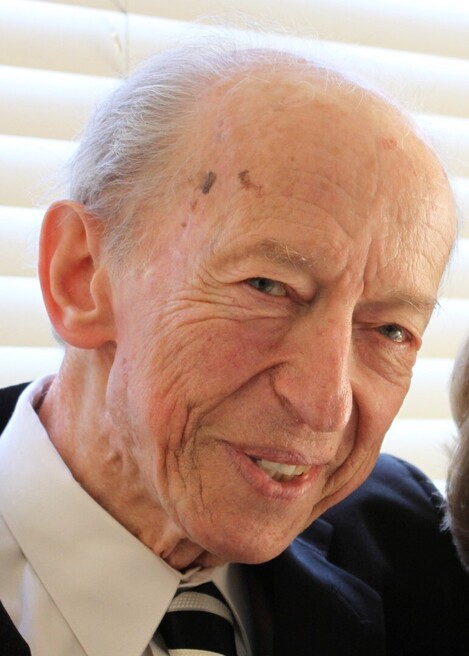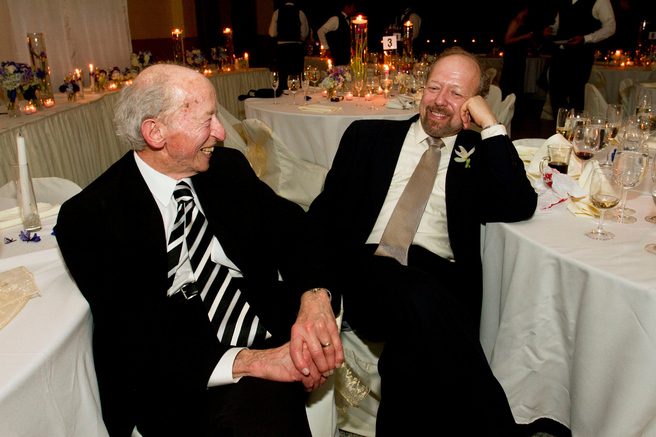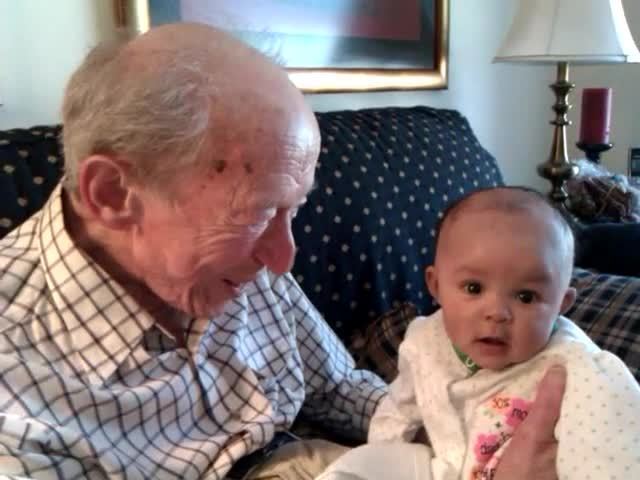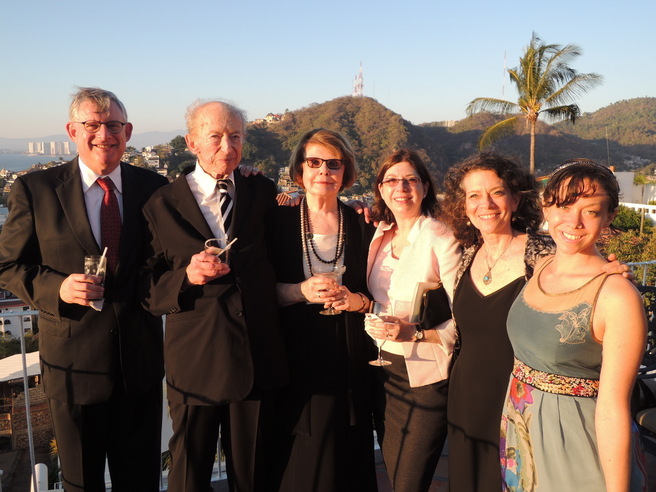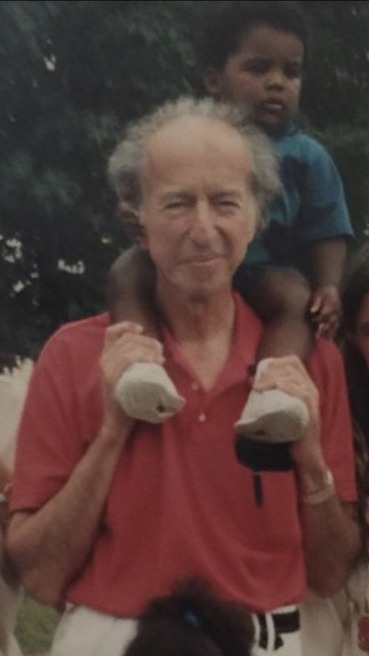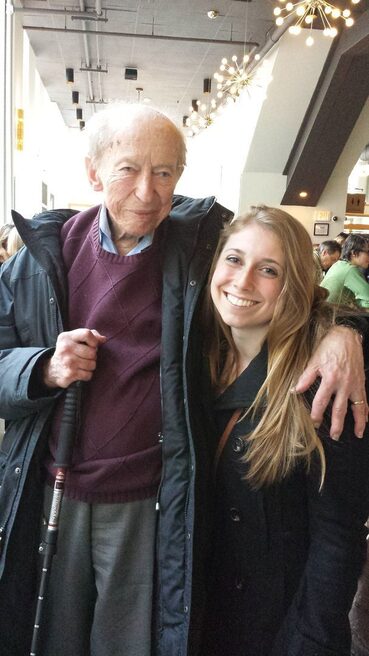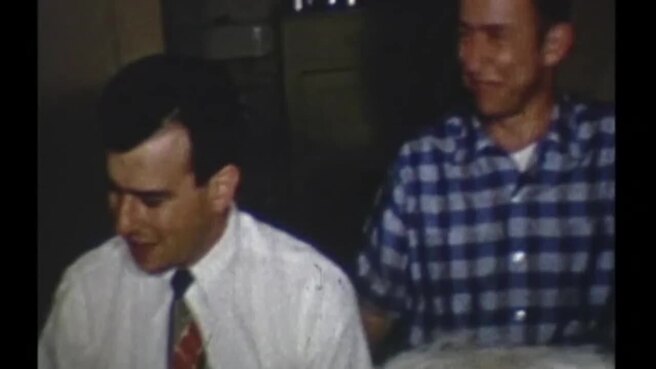From Jerry's memorial: Remembering my father
On May 12, our family held a memorial for my father at the Michigan League in Ann Arbor. We are tremendously grateful to the more than 200 people who came together to remember him then. Here are my remarks from that day about my father and his deep connections to the people who came and the wonderful family and community they represent.
We’re going to hear from many wonderful speakers today. They’re going to share their memories and perspectives on my father as colleagues, as friends, and as family. Before they begin, I’d like to share some of my own thoughts to help tie those different threads of his life together. And I’d like to share some of my father’s own memories that show how he became the person he was, from conversations I had with him and from some interviews that my son Ben and I did with him about two years ago.
My father did research on group identity in his career, and he was a proud member of many groups himself. He was a Jew, an American, a Democrat, a New Yorker and a Michigander, a University of Michigan social psychology professor, and a beloved, central figure in his family and in his network of colleagues and friends. He identified with all these groups, but not to the exclusion of any other. Jerry was one of the most inclusive people any of us has ever known. He was first and foremost a kind, compassionate human being. And he was, as we would say in Yiddish, a real mensch.
His Jewish identity developed first, growing up in the Bronx with his immigrant parents Morris and Sarah, and his brothers and sisters, Ann, Arnie, and Gloria. My father’s family was not really religious, but they were strongly committed to the Jewish community, Jewish history, and Jewish values. When my father talked about his bar mitzvah more than 80 years later, he still remembered how he felt a deep sense of history participating in a ritual that Jews had followed for thousands of years, even when they had to practice their religion in secret.
He and I both felt that sense of history very personally when we traveled to Israel together a decade ago. We had the overwhelming experience of going to Yad Vashem, the World Holocaust Remembrance Center, and using their digital archives to find records about his grandmother and his father’s family.
But we also went to East Jerusalem to try to better understand the lives and the suffering of the Palestinians. Because for my father, being Jewish was about learning from our own history of suffering to be compassionate to others.It was about being committed to making the world better for everyone. He embodied the Jewish concept of tikkun olam – the commitment to heal the world.
My father also identified as an American. He was often frustrated by America: He saw in his life how America could “go crazy” from time to time, as he put it, and he felt we were in one of those crazy periods now. But he believed in what America should be, the America that his parents and other immigrants came here to find – a land of opportunity, as the saying goes, with liberty and justice for all.
Jerry was a child of the FDR era. He remembered being about 10 years old, shortly after FDR was elected, and listening with his family to FDR’s first Fireside Chat.He could still describe vividly how they sat in the living room, tuned in to their old radio, and heard FDR’s voice come through, feeling as if the President was talking directly to them. FDR was President until my father was 22 years old, and those years shaped his world view. He was part of the Greatest Generation and served in Europe during World War II, a critical part of his life that he remembered very clearly as long as he lived. And he became a staunch New Deal Democrat and identified with those values for the rest of his life.
My father was also a real lifelong New Yorker, although he loved Ann Arbor and his life here for more than 70 years. He grew up going into Manhattan with his family to see movies, plays on and off Broadway, and even the Metropolitan Opera, where you could get tickets in the second balcony for 55 cents. He also developed a New Yorker’s passionate interest in politics and world affairs. Even though his father Morris only had a sixth grade education, he read The New York Times every day, and my father became a lifelong Times subscriber too.
Jerry was there at the birth of social psychology as a field: He joined the social psych graduate program at the U of M very early on, and Michigan was one of the very first universities in the country to start such a program. He went there, he said, because he was very interested in “what makes people tick,” as he put it, and what motivates them. And he was also very curious about the social influences on how people develop those motivations. So he joined the “brand new field” of social psychology: “sociology and personality study combined.”
My father loved survey research, he said, because it was “a systematic way of examining an issue [as] a way of studying contemporary history.” He went on to become a founder of the Institute for Social Research and to a very long career at the U of M, working at the university until he was 92 years old. He worked as long as he could because he thrived on the intellectual challenge, the chance to address social issues, and the chance to work with colleagues he cared about.
My father’s work also shaped his personal life profoundly. Through his work he met Pat, his wife for 54 years, with whom he had such a deep, loving, lifelong bond. And through his work, often in collaboration with Pat, he engaged with the issues of race, ethnicity, and diversity that were so important to him. As he became close to many African-American and Latino and Latina colleagues, he told me he appreciated how their experiences resonated with his own experience growing up Jewish. He felt they all shared what it’s like to be both part of America but separate from the dominant American culture, with your own vibrant, connected, and often joyous culture and community. My father relished America’s diversity and he was proud to be part of it.
At the end of the day, what mattered most to my father were his connections to other people – his colleagues, his family, and his friends. And it mattered to him that he mattered to them. He told Ben and me that he largely modeled himself on his own father. The lesson he learned from Morris, he said, was that “the most important thing for a man is to be someone that others could depend on.” My grandfather played that role for his extended family and in the New York Jewish community. And I think my parents, Jerry and Pat, played that kind of role for this wonderful extended family and community that all of us here represent.
I’ve been extremely lucky to be their son, in so many ways. I always hope that I can be as much of a mensch in my life as my father was in his. I loved him deeply and unambivalently, admired him tremendously, and learned so much from him, all my life.
In closing, I want to share a few of my father’s own words. I had many conversations with him during the last year and he often talked about how he felt facing the end of his life. As he said, he was determined that “I will not go kvetching into that good night.” He felt tremendously fortunate that he had lived to the age of 96, that he had no serious illness or pain, and, most of all, that he was able to end his days at home, surrounded by a loving multigenerational family. He was immensely grateful to Pat, who was so much the core of his life and the source of his strength; to Jenny, who helped and supported and cared for him in so many ways; and Brooklyn, you were just a joy to him every single day.
A few years ago, when he was 93, my father talked about facing his mortality in an interview with my cousin Lynn and her daughter Maraya, who are here today. Here’s what he said:
I’m not dwelling on it and I’m not scared of it. It’s simply a reality when you’ve lived 93 years. There is so much that I still want to do, so much life in me, but there is the reality.
I’m handling it better than I thought I would. Better doesn’t mean profound thoughts, or great revelations, or great insights on the subject of death.I mean better in the sense that I’m enjoying things, [and] enjoying life to me means still being connected. I just enjoy days with people.I just treasure them because there’s a realization it’s not going to go on forever.
I have no regrets about the road not taken, no things that I could’ve or should’ve done differently. Equanimity is the word that would describe how I’m dealing with life. Equanimity means acceptance. It is a kind of evenness of things. It’s being at peace, accepting that I’ve done the best I could, and it’s not bad.It’s a positive, even-keeled acceptance.
The important things in life are the relationships you form and the meaning of those relationships to you.That’s what sustains you.That’s the basic thing. And then to find meaning in the work that you do; to be involved in the world; and to find your purpose.
As much as he loved life, I think my father was ready at the end. The one thing that made him sad about dying, he said, was that he wouldn’t get to see how everyone’s “story” played out. He cared about all our stories, from those of us who are now in our seventies and eighties to the great-grandchildren who haven’t yet been born.
I know I will remember my father and his story, and will miss him, with so much love, to the last day of my life. I hope that you will remember him with love and joy too for as long as you can.
I’m very glad to be here to remember my father and celebrate his life with you today. He would be overwhelmed with joy to see all of you here: Your coming here today is the greatest possible tribute that he could have. All of you here really represent his legacy. Thank you so much for being here so we can remember him together.
How my father shaped my life
As I’ve been preparing for Jerry’s memorial next weekend, I’ve been going over many memories and writings from the past. All of us in Jerry’s family contributed to a book of memories in 2017 for his 95th birthday celebration. Here is my letter to him from that book, to share something of what he meant to me in my life.
Dear Dad,
It’s a little overwhelming to know what to say. 95 years – and I’ve been around for 63 of them! I feel incredibly blessed that we’ve had so many decades together, and feel that we’ve gotten closer than ever over the years.
As time has gone by, I’ve realized more and more how much we are cut from the same cloth. People often remark on how much we look alike, except for the facial hair: You only had a beard for a year or two, until you decided it made you “look like Methuselah,” and I grew mine back after taking a hard look in the mirror each time I shaved it off.
But beyond that resemblance, I’ve come to realize how much we share the same interests and passions. Math and science – the love of numbers, fascination with the universe, and respect for data. Great theater and movies, both old (including the really old) and new. Psychology as a context for understanding relationships and the world. And our shared Jewish identity: Our amazing trip to Israel together was one of the best and most meaningful weeks of my life.
While I didn’t inherit your love of football and basketball for some reason, we do share a passionate interest in politics, which may be the ultimate high-stakes sport. And in that arena we always root for the same team. I think your anger at the Tea Party kept you young for many years, and I see that Trump will keep you engaged and energized now – a silver lining for what we’re all enduring in this “interesting” administration.
I’ve tried to emulate your qualities as a person, and hope I’ve managed to pick up some of them. You are a mensch in every sense of the word. You taught me early in life that a mensch has to be able to feel, deeply and authentically, even when feelings are painful. You may be the most genuinely kind person I know. In one recent conversation in Ann Arbor, you said that you simply didn’t understand meanness – you couldn’t imagine taking pleasure in someone else’s humiliation – and I can’t remember ever seeing you do a single mean-spirited thing. But your kindness and empathy are also your strength. You have an inspiring commitment to social justice, and a fury at injustice, that has been a compass for your actions and decisions in life.
I remember many points in my life when you helped me find my path. You fostered my interest in math and science from a very early age, with science kits, trips to the planetarium, and an amazing box of gadgets that introduced me to probability and statistics. I still remember the mechanized coin-tossing machine and a plastic-and-BB’s contraption that demonstrated normal distribution (I’ve learned since then that it’s called a Galton Box). I also remember you gave me a book on probability and gambling as a kid, and we talked about going to a casino together when I turned 21. It took about four more decades before we made it to the craps and blackjack tables at FireKeepers Casino, but I’m glad we finally did!
When I reached my late teens you helped me rediscover those early interests. The summer after my freshman year in college I was planning to major in psychology – my version of going into the family business – when you and Pat gently encouraged me to consider other options. (I think your exact words were, “For God’s sake, please try something else!”) I settled on majoring in biochemistry and found that it fit. Then, as I was pursuing my major, you were the first person to suggest that I might follow Isaac Asimov’s model, combining my interests in English and science to become a science writer. I didn’t quite see it at the time, but soon that path opened up and I was launched on what has been a challenging, rewarding, and multifaceted career.
While you helped me find this particular path, I know you and Pat would have supported any direction I chose to take in work and in life. You both have always been encouraging and positive, have reminded me of my value when I most needed to hear it, and have helped me face the future with energy and optimism. I’m grateful to both of you for that steady and loving support over the years.
I know that the last few years have not been easy for you as age has started to have its inevitable impact. But you swore after you turned 90 that “I will not go kvetching into that good night,” and I believe it. I admire your spirit, your equanimity, and your wonderful engagement with your multi-generational household. I’m still learning from you, as you show us all how to live in the moment, appreciate life with gratitude, and keep trying to practice tikkun olam – healing the world – in whatever ways we can. So let’s say l’chaim – to this day, to your life, and to all our lives together!
Your loving son,
Joel
Grandaddy Singing to Us
I will always remember Grandaddy singing to us. In the living room, with one of us on his lap, he would often sing a song called Oyfn Pripet shik/At the fireplace. Here is a video of him singing this song to Brooklyn. Lyrics below.
"A flame burns in the fireplace, the room is warming up, as the teacher drills the children in the Hebrew alphabet (alef-beyz): Remember dear children, what you are learning here. Repeat it over and over. When you grow older you will understand that this alphabet contains the tears and weeping of our people. When you grow old and weary you will find comfort and strength in these letters."
From Phil Bowman
I love Jerry Gurin – he was a true mentor with compelling intellect and strong indignation for racial injustice! Jerry’s pivotal role in my own life started when I was only 22 years old and some of my fond memories are shared in the reflections by Thomas Gordon, James Jackson, Belinda Tucker, Vonnie McLoyd, Harold Fairchild, Harold Neighbors, Ron Brown, and Marv Peterson…. In Fall 1970, I was first introduced to Jerry and Pat by their colleague and friend Daniel Katz after he read my research paper for his Advanced Social Psychology class – and these three are the major reason I decided to pursue a Ph.D. in social psychology at Michigan. As a mentor, Jerry became my challenging teacher (2 courses), role model (ISR-research scientist and CSHPE professor), career coach, and most important extended family member.
Jerry was like a wise, supportive, father-figure to James Jackson, Belinda Tucker, and I – as he empowered us to envision and specialize in the impossible as we developed the ISR-based National Survey of Black Americans and Program for Research on Black Americans. As extended family and neighbors, we also co-parented our children (PJ, DuBois, Becky, Jennifer) during elementary school and grandchildren (Chloe & Akilah) in day-care. As a true Jewish intellectual, Jerry personified the ancient values of MAAT – truth, justice, righteousness, balance, reciprocity, and propriety. It is my true blessing to have known Jerry and a true inspiration to see him "thrive" until 96 – with Pat’s enduring love and grace. To Jerry’s enduring spirit – “I am because you are”….
Phillip Bowman, Professor of Higher Education, Faculty Associate, ISR-Program for Research on Black Americans, Director, Diversity Research and Policy Program, University of Michigan
Jerry's Speech at Liz & Paul's Wedding
Here are the words that Jerry spoke at the wedding of Elizabeth Levey (Jerry's great-niece) and Paul Stroka. They convey three important aspects of Jerry’s life: his strong commitment to family as a central Jewish value, the importance of commitment, and the impact of being part of an immigrant family.It refers to The Little Prince, a section of which Elizabeth and Paul had read at the ceremony.
As stated so beautifully in the first and second readings, the foundation of marriage lies in the commitment that two people make to each other. The commitment is what another GIVES TO YOU when you face dark times – someone to lift you up when you fail – someone to warm and comfort you when you are cold.
Even more important is the commitment that YOU GIVE to your rose – the special love and meaning that you find in life by tending, nurturing, and being responsible for another.
Beyond marriage, commitment is also the foundation of ties that we form as members of the broader family that marriages are part of.In Jewish history and tradition, the family has been the focal institution for transmitting Judaism’s basic norms and values, and for the continuity of Jewish life over the centuries.
I am the uncle of Elizabeth’s father, Mark, and the oldest of the Gurin-Levey-Ross family present here today. My mother and father were immigrants who came to America in their twenties.Some of the happiest memories of my childhood are the gatherings we had with other members of my mother’s and father’s European family – the uncles and aunts who had also migrated to New York, and their children, my cousins, who were born in America.We were an immigrant family, huddled together in small New York apartments.The family gatherings were joyous occasions as we kissed and ate and shared our lives, assured that each of us was tended, as was the Little Prince’s rose.
The commitment of two people in a marriage ends when the two people are gone.But commitment in the family lasts over the generations.The family provides continuity of the commitment. Our family gatherings now involve four generations.We have gone forth from the New York apartments and spread throughout the breadth of America.
We have moved from people with the same Jewish heritage to family sharing many different heritages, all with a common ethic and ideals that have shaped the American experience.We have remained bonded and committed through family reunions and celebrations of holidays and through both sad and happy family events, like the one that brings us here today.
While my family’s history differs from others in its details, it is not an unusual American story.Paul also comes from a family that has remained remarkably close despite some members having dispersed at times from their original roots in Chicago – not New York.
So it is very fitting that our family gathers here today to celebrate a wedding in a land very far from where we started, a wedding within our broader families symbolized by commitment and continuity.
From Rhea Kish
We have lost a person of sterling character. A faithful, caring friend, always ready to help you. Devoted to his family through its travails. Concerned about world problems and the fate of mankind. Never unkind or petty, and supportive of justice for all. We will miss his spirit and caring. I am so grateful for his friendship all these many years, and will miss all our wonderful times together.
Rhea Kish, long-term friend
We feel so fortunate to know Jerry. Although we didn’t get to spend much time with him.He taught us so much. He was very peaceful and loving person.He had such a positive attitude and selfless love for everyone. Jerry led an honorable life and was so kind to everyoneOur heartfelt condolences to Pat and the whole family. Our prayers are with all of you. We would end with this quote by Peyton Conway March which is a befitting tribute to Jerry: “ There is wonderful mythical law of nature which states that the three things we crave most in life- happiness, freedom and peace of mind- are always attained by giving them to someone else. “
My GrandDAD
Nothing I say can accurately express the importance you’ve had on my life granddad. You taught me so much both directly and indirectly. You we’re the only constant father figure in my life and showed me how to love, care and be patient with not only people but with life. I will forever cherish the memories we made: you teaching me math, how to drive, how to tie a tie and how to love Michigan Football (just to name a few) . I will never forget our drives to school listening to Mojo In The Morning especially war of the roses (you thought it was so off the wall but since I loved it you decided to put your feelings to the side and enjoy it as well). I can not remember a time I couldn’t count on you. If it was in your power to be there or do it there you were. I watched how you interacted with grandma and it showed me how to be when I too find the woman of my dreams. I paid attention to your acceptance and patience when interacting with our family and it showed me how to act when I have a family. I remember our conversations about life and how you always reminded me “If I could get my shit together and figure out how to live life, you can tooBryan”. You believed in me more than I did myself granddad. You loved me more than I did myself. I love you so much and will appreciate and miss you forever.
From Elena Ross
Uncle Jerry had an incredible influence on my development as a person. His presence in Ann Arbor provided me comfort throughout those years. The words, stories, and affirmation I received from Uncle Jerry - most especially when Pat and Jerry invited me over after I had been targeted by the Jewish community on campus for my support of the Palestinian students - illuminated such a special and rare side of both of them, to which I will always aspire. There are no words to describe how much the support meant to me.
Uncle Jerry had a rare and beautiful spark in him that I will forever remember. His voice, his disposition, his generous heart, and his love of learning will never be forgotten. His stories will live on, and his demonstration of what it truly means to be a family will continue to strengthen all of us.
Elena Ross, Jerry's great-niece
From Woody Neighbors
I am tremendously honored to have had the good fortune to have known and to have been mentored by Jerry early in my graduate career -- a time when I needed so badly the intellectual guidance that he provided. More than that however, was Jerry's infectiously POSITIVE attitude toward the work he and I were doing ("Section F!"), the reading and thinking I was doing on how to study help-seeking, and toward life. My memories of Jerry always include him having a good laugh -- he kept everything upbeat and, at least for me, kept me motivated and feeling tremendously hopeful. When I was around Jerry, I had no self-doubt! I came away thinking, "I can do it!" What a gift he gave me. I've tried my best to emulate that kind of encouragement with students I've known over the years.
Jerry was the lead author on THE classic, "Americans View Their Mental Health." I cannot think of any other book I read as often as that book. It represented a significant paradigm shift in the way the field thought about mental health and the application of survey research methods to self-assessment, coping, and behavioral response. I will always cherish my signed copy.
Harold “Woody” Neighbors, C.S. Mott Endowed Professor of Public Health, Michigan State University
From Larry Bobo
Though my interactions with him were few, Jerry was one of those figures from my time at Michigan who was an inspiring example and made me feel quite fortunate to be a student among such scholarly giants who were still good human beings.
Lawrence Bobo, Dean of Social Science at Harvard University
From Nora Stephens
Jerry was always such a warm, thoughtful, caring, and inquisitive person. I remember him asking me such smart questions about my beliefs. Every time he told me Papa [Leslie Kish] would be proud, it made me beam. I also had a soft spot for his New York Jewish accent - I can hear it so clearly now. The family of Pat and Jerry is so special - it says so much about each of them as individuals and as partners.
Nora Stephens, family friend and granddaughter of Rhea and Leslie Kish
From Sylvia Hurtado
Jerry was well-loved and well-lived. I recall how he savored the steak at the steakhouse in town when we celebrated the Supreme Court win in 2003. Although I didn't see him near the end of his life, I am sure he knew he was loved from Pat, the children, grandchildren, and the many former students he mentored. My heart goes out to you and your family. His commitment to social justice revitalized us all lives on in all of us.
Sylvia Hurtado, Professor of Education, UCLA
From Hal Fairchild
I cherish every memory I have of both Pat and Jerry. It was Pat and Jerry who opened their home to the cadre of African American students at The U of M. The two of them were the guiding lights for students of color. Their marriage reflected a bond that was and is a model for all couples. Jerry was a magnificent orator. I remember so well his talk at his 90th birthday party where he praised social psychologists – and challenged us – for making a positive difference in the world. Jerry’s intellect and wit provided the foundation for social psychology’s continued involvement in pressing social issues. Jerry was a man of integrity and family. I loved him.
Hal Fairchild, Professor Emeritus of Psychology and Africana Studies at Pitzer College
From Mark Chesler
Gerry was a mensch in the best sense, geographically New York, intellectually formidable and humanly touchable.
Mark Chesler, Professor Emeritus of Sociology, University of Michigan
From Marv Peterson
I am one of the CSHE's early graduates who benefited from Jerry's guidance and friendship, first as a graduate student then as a faculty colleague. In addition to all his personal guidance, insights into the world of academe, and his friendship and good advice, I still remember all of the wonderful times that he and Pat hosted us at their home. Both of them have had a generous and caring perspective that so many of us have benefited from.
Marvin Peterson, Emeritus Professor of Higher Education, University of Michigan; former Director, Center for the Study of Higher and Postsecondary Education
From Jeff Ross
I know he was a brilliant scholar, professor and mentor to so many but, to me, he was always – and will always be – just a wonderful, kind and generous uncle: always interested, always supportive, always engaged. It is difficult to imagine the family without him.
Jeff Ross, Jerry's Nephew
From Jim & Wendy House
Jerry was a very special man to us, ISR, U of M, and the wider world. Jerry was a true founder and leader in developing interdisciplinary social science in the public interest and for social justice in all of these venues. As much as anyone, Jerry was also responsible for our returning to Ann Arbor in 1978, based on his review of my first federal grant proposal to NIMH, and a supporter to us, and so may others, ever since. And perhaps most important of all, he was simply the epitome of a "mensch" in all the best senses of the term. We will forever miss his effervescent positive presence in our lives.
From Terrence McDonald
In my every encounter with him Jerry was one of the sweetest men on earth and his impact on the campus was gigantic in every arena in which he worked. Much of what we think of today as “DEI” was pioneered by Pat and him, certainly on the research front.
Terrence McDonald, Professor of History and Director; Former Dean of LS&A, University of Michigan
Remembering Jerry: From his niece Elisa Ross
Jerry was a wonderful, wonderful human being and I can only imagine what it was like having him for a grandfather, grandfather-in-law, father, father-in-law and husband.
He was also a wonderful uncle-in-law. My favorite uncle, in fact! I loved him so much!
I’d like to give you some examples of how great he was to me, and why I will never forget him, his kindness, his sense of humor, his graciousness.
When I was early, early in the family, and not at all official, Jerry and Pat and Jenny opened their home to me, to stay for a few weeks while I found an apartment in Ann Arbor. They fed me with food and also with family stories. They talked with and listened to me like I actually mattered. I felt so grown up at age 23, and yet so cared for. Cocktail Hour was a thing and Jerry always offered to pour me a strong one! So appreciated as I tried to figure out my future!
They accepted our engagement happily and threw a party in our honor for our med school friends. Always the host, I have lots of pix of Jerry chatting up all these future docs in that impossibly glamorous castle-house.
Fast forward to family reunions with his artfully told stories of the old days. More Happy Hour chats. More love.
At Passover, we would look forward to hearing his sonorous voice leading us out of Egypt. And when Elena had her baby naming, he willingly participated in the readings and lent his observations, which, as usual, were articulate and insightful. Their special relationship grew and she interviewed him for her family history/World War II project.
And how he took care of her when she went to Michigan! They had lunch by themselves often, and he and Pat were excellent sounding boards as Elena figured out her future and her social justice values. But that’s her story and I’ll let her tell it. Just to say that when someone loves your kid, you love them all the more.
I was also grateful to Jerry for his steadfast friendship with Gloria through the years, especially meaningful to her after Art’s death. Again, he loved those that I loved, so the love just grew. And him encouraging her to go to Israel was critical to our having an amazing family trip and connecting with more family. So grateful.
(I've included a short clip of Jerry laughing in the 50’s. there’s no sound, but you KNOW what it sounds like!)
From Lester Monts
When I came to Michigan in 1993, OAMI was in the midst of the Michigan Student Study. Although good people were working on the Study and progress was being made, questions were circulating in administration about its reliability. When Jerry began working with John Matlock and others, that all changed. Jerry’s participation in the Study raised its importance and it went on to be critical data in the Supreme Court cases [for Affirmative Action].
Jerry was such a fun-loving person, and we all appreciated his wry sense of humor. I will always remember when OAMI celebrated John's 25th year anniversary and Jerry came dressed in the jogging suit that John was wearing when he was arrested at the CCRB in 1995. That was hilarious!
I will always remember Jerry’s dedication to “the cause” and how he went about with a conviction to do the right thing. I will never forget the power of his deep baritone voice. I will never forget how he was able to put pressing issues into their proper perspective. And, now that I’m a grandfather, I will never forget his love for his children and grandchildren, a trait I will strive to to emulate.
Lester Monts, Arthur F. Thurnau Professor of Music (ethnomusicology); Former Senior Vice Provost for academic affairs and senior counselor to the president for the arts, diversity, and undergraduate affairs; University of Michigan.


